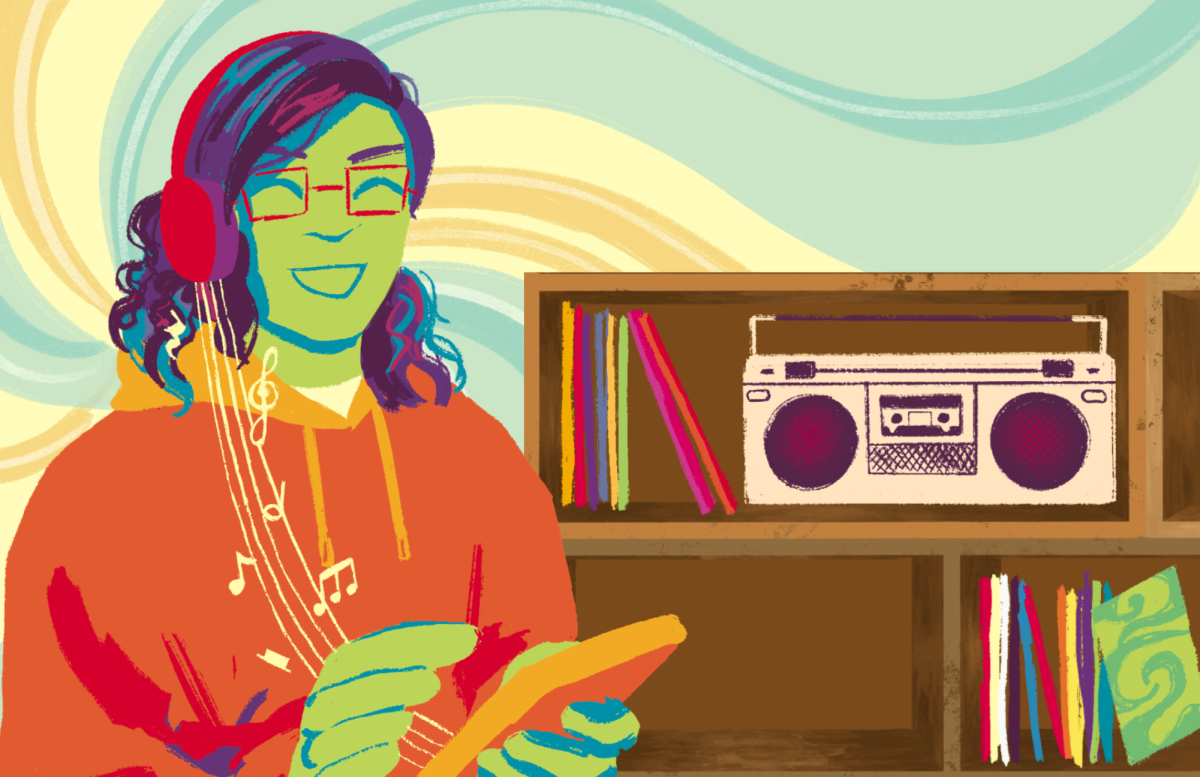When they were younger, English teacher Mark Carpenter spent a lot of time thumbing through secondhand records and CDs in record stores around Los Angeles and Long Beach. Unlike the modern streaming age, discovering new and independent artists back then was “sometimes a bit of a hunt,” but to Carpenter, the searches ultimately paid off when they would discover tracks that strongly resonated with them.
“It was weird electronic music like Aphex Twin and Squarepusher,” Carpenter said. “I didn’t know how you could make sounds that just felt so alien — it was interesting. And in artists like The Mountain Goats, for the first 20 years, it was just a guy and an acoustic guitar. Every song’s sound is the same, but the lyrics just speak to me, like, ‘Oh wow, these songs are for me exactly.’”

Independent music, or “indie” for short, gained popularity in the 1980s. While the term originally signified that the music had been released through an independent label, “indie” is also used to describe more subjective characteristics of music, such as the use of certain instruments or emotions. To sophomore Rishi Salvi, indie music is defined by a more relaxed feeling, especially in contrast to mainstream music, which he believes might lean towards being “earworms” instead of genuine art. He recalls listening to the indie band Arctic Monkeys for hours in the car when driving around Alaska, appreciating the way the music fit into the background instead of imposing itself in the foreground.
“I feel like a lot of typical rap or typical pop is really intense, where I feel like indie rock or R&B is a bit more mellow,” Salvi said. “It’s more personal in the sense that it’s targeted to be more vulnerable — it’s not an industry thing. It’s targeted to a person. That’s something I enjoy.”
Salvi found himself resonating with the relatability of indie music, particularly the personalized feeling of the lyrics. While he grew up listening to mainstream pop, the genre eventually began to disengage him, as he felt that the emotions in the songs lacked nuance.
“Indie is a lot more personal,” Salvi said. “I feel that in a pop song, a typical mainstream song, it’s targeted to be the best a person can be, and it’s supposed to be your highest point. But most people aren’t at their highest point, and most people aren’t at their lowest points. They’re somewhere in between, and indie music is meant to be focusing on the in-between. It’s something that you can relate to — not everyone is going to be like Ariana Grande.”
Carpenter agrees with Salvi’s perspective, citing emotional resonance as another reason indie music can be appealing to people. Along with the appeal of the music itself, they find that potent lyrics can draw them closer to the song.
“There’s that deep, personal connection of feeling like you already know a song the first time you hear it,” Carpenter said. “And then there’s that other connection that drives this other side of my music taste, where I didn’t know they could do that. I didn’t know people and musical instruments and computers and tape decks and turntables could make those sounds. That’s cool, too.”
Carpenter references the song “Cubs in Five” by The Mountain Goats, whose lyrics cynically describe unlikely events — such as that “the Chicago Cubs will beat every team in the league” — and juxtapose that unlikeliness with the idea that “I will love you again / I will love you like I used to.” Not only was it the first song by The Mountain Goats they had ever heard, but their father was also a loyal Cubs fan, adding another layer of connection.
“Is this just the dork’s version of Taylor Swift’s ‘We Are Never Ever Getting Back Together’?” Carpenter said. “But I think no — there’s this optimism of these massive improbabilities that you just believe in with your whole heart. That spoke to me.”
In contrast, senior Yannis Chen focuses more on the technical aspect of music when searching for new songs to listen to. Chen, who enjoys artists like Jessie Jo Stark and Niia, believes that while she associates “indie” with the type of music she listened to when she first got into indie, the same word could have different meanings to different people.
“There’s a lot of sadness and really long album titles,” Chen said. “I feel like it’s the teenage stereotype of a bunch of emotions that are just thrown together instead of having a more refined sound. But it’s hard to characterize.”

Chen elaborates that the vagueness of the term makes discussions surrounding indie music difficult, and Carpenter adds that the more abstract definition of “indie” isn’t useful for effectively describing music. To Carpenter, while it used to refer to the artist’s record label, the mainstream connotation of the term has rendered it more imprecise than ever.
“I think ‘indie’ was a more useful label when it distinguished a major record label from an independent record label,” Carpenter said. “I know in the late 90s, a lot of mainstream artists found themselves with very bare bones support, if any, from their labels, making the distinction less meaningful there. And now, with distribution widened up so much, I think it’s even less important.”
Salvi believes that relying heavily on genre labels to find new music can be prohibitive, even if it’s a label as vague as “indie.” He encourages people to explore different genres and not restrict themselves to any specific label, especially when different genres can share similar sounds and ideas.
Carpenter agrees that using “indie” as a restrictive label is unnecessary, especially when the core appeal of the music has nothing to do with the status of the artist’s record label. Rather, it has more to do with the emotions with which the artists approach their music, and that can be a powerful force in both mainstream and independent sounds.
“It’s a kind of DIY ethos, this idea of making it without patrons, making it with passion,” Carpenter said. “And the thing is, I don’t think that’s necessarily untrue about major artists. Music is great, and people who love it and are passionate about it make the world go round, whatever it is.”










